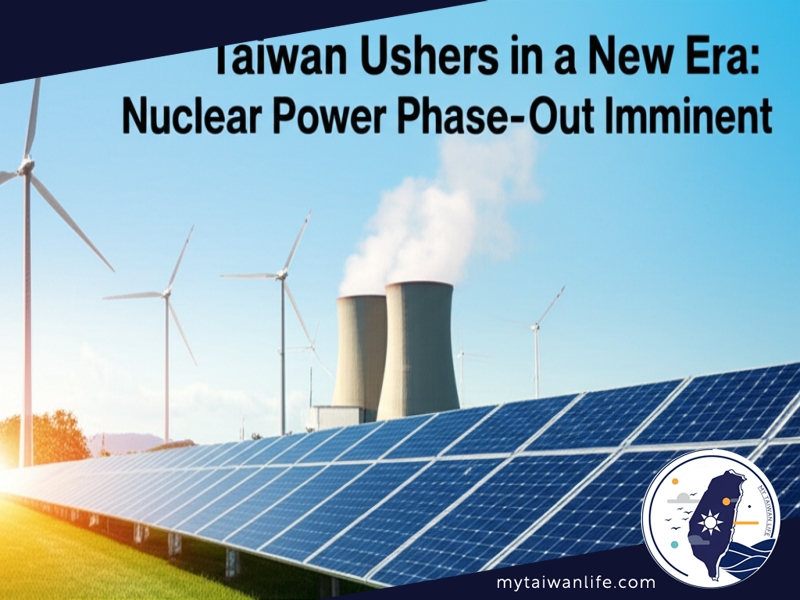Taiwan Ushers in a New Era: Nuclear Power Phase-Out Imminent
Transitioning to Renewable Energy and Gas, Taiwan Prepares to Decommission its Last Nuclear Reactor

TAIPEI (Taiwan News) – Taiwan is on the cusp of a significant energy transition. Following the decommissioning of the No. 2 reactor at the Maanshan Nuclear Power Plant in Pingtung, the Ministry of Economic Affairs has announced the cessation of nuclear power generation.
Nuclear power previously contributed significantly to Taiwan's electricity supply, accounting for over 10% in 2016. However, its share has steadily declined, reaching approximately 3.6% between January and March. This move reinforces the government's commitment to a "nuclear-free homeland" policy, aiming for a complete phase-out of nuclear energy by 2025, as reported by CNA.
Premier Cho Jung-tai (卓榮泰) has assured the public of a stable power supply, stating that new power generation units will be integrated into the grid this year. The government aims to maintain a 10% reserve capacity during the day and 7% at night, projecting stability through 2032.
A substantial influx of new power sources is planned, with the addition of nearly five million kilowatts of large gas-fired power units. These new facilities are strategically located at the Datan power plant in Taoyuan, the Hsinta power plant in Kaohsiung, and a power plant in Taichung. Their combined capacity surpasses the 950,000 kW produced by the soon-to-be-decommissioned No. 2 reactor at the Maanshan Nuclear Power Plant.
The Datan power plant is particularly critical, serving as a major electricity source for northern Taiwan. Taipower is actively constructing three gas-fired power units at the facility, with a total capacity of 3.16 million kW. Two units are already operational, and the third is slated to begin operations this summer.
Simultaneously, wind and solar energy are showing robust growth. In April, solar power generation exceeded 10 million kW in a single day, while wind power surpassed three million kilowatts. Renewables now account for around one-third of Taiwan's electricity generation.
However, some political entities have expressed dissenting views. The KMT and TPP legislative caucuses have proposed amendments to the Nuclear Reactor Facilities Regulation Act, seeking to extend license renewal deadlines for aging nuclear power plants and potentially easing restrictions on their reactivation.
Economics Minister Kuo Jyh-huei (郭智輝) clarified that restarting the Maanshan Nuclear Power Plant would be a lengthy process, estimated to take approximately 1.5 years, primarily due to the need to procure new, custom-made fuel rods and conduct comprehensive safety reviews.
Addressing the issue of spent nuclear fuel, Taipower explained that it will first be stored in cooling pools at the plant to dissipate heat. This will be followed by a transfer to interim storage facilities for roughly 40 years, before eventual relocation to a permanent disposal site.
Challenges remain, particularly regarding the establishment of nuclear waste storage facilities, which have faced opposition from numerous local governments. Taipower has indicated that continued reliance on nuclear power would necessitate new legislation or revisions to existing laws related to nuclear waste management.
Other Versions
Error: All DeepL API keys exceeded 95% usage.
Error: All DeepL API keys exceeded 95% usage.
Error: All DeepL API keys exceeded 95% usage.
Error: All DeepL API keys exceeded 95% usage.
Error: All DeepL API keys exceeded 95% usage.
Error: All DeepL API keys exceeded 95% usage.
Inihahatid ng Taiwan ang Bagong Panahon: Pagtatanggal sa Lakas Nuklear Malapit Nang Mangyari
Error: All DeepL API keys exceeded 95% usage.
ไต้หวันเปิดศักราชใหม่: การทยอยยกเลิกพลังงานนิวเคลียร์ใกล้เข้ามา
Đài Loan Mở Ra Kỷ Nguyên Mới: Giai Đoạn Loại Bỏ Điện Hạt Nhân Sắp Xảy Ra

